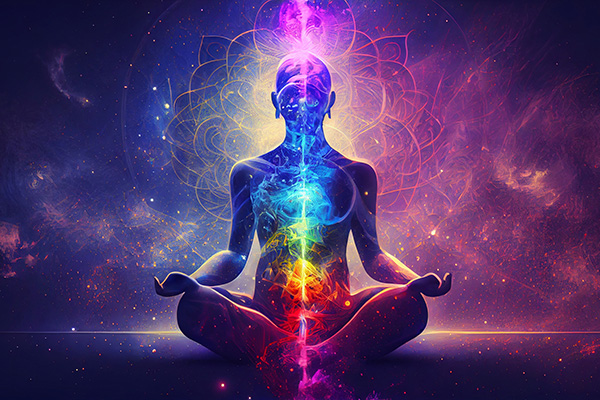 I realized that I possessed the gift of spiritual healing many years ago during a visit to my father in the hospital. He was in significant discomfort, and something compelled me to gently touch the knee on which he had just undergone surgery. My intention was solely to comfort him, but I noticed his face transform from excruciating pain to immediate relief. This struck me as a miraculous moment!
I realized that I possessed the gift of spiritual healing many years ago during a visit to my father in the hospital. He was in significant discomfort, and something compelled me to gently touch the knee on which he had just undergone surgery. My intention was solely to comfort him, but I noticed his face transform from excruciating pain to immediate relief. This struck me as a miraculous moment!
The next profound healing miracle occurred when one of my twin daughters, at around 8 years old, was ice skating. I was observing the children relishing the beautiful winter day when my daughter unexpectedly slipped and fell. Her agonizing scream is etched in my memory. I instinctively knew something was seriously wrong! By the time I reached her, others were already assisting, but her screams persisted. Hearing her in distress pierced my heart like an arrow.
Upon reaching her, I immediately noticed the bone sticking out through her skin. I placed my hands over the fracture on her forearm and softly said, “It’s okay, it’s okay.” Instantly, she ceased crying and exclaimed, “Mommy, it doesn’t hurt anymore.” I was astonished, as were the onlookers.
I supported her arm all the way to the hospital, but once we arrived, they insisted I remove my hands. Again, I had to endure the sound of my daughter screaming in pain, feeling utterly helpless.
After they stabilized her arm, they allowed me to see her. I laid my hand on the cast and instantly sensed it was improperly fitted. Initially, they were reluctant to believe me, but I persisted in asserting that something was amiss. Eventually, they consented to a second x-ray, which revealed that my daughter’s arm was indeed misaligned. Consequently, she required another procedure. A nurse asked me how I knew. I chose not to respond.
A healer’s power is not derived from any unique ability, but rather from the courage and awareness to embody and express the universal healing power inherent to every human being ~ Eric Micha’el Leventhal
Once the second cast was applied, I felt reassured that her arm was properly positioned. However, another issue arose. I sensed that the cast was digging into her bent arm. Once again, my concerns were dismissed. To this day, my daughter bears a profound scar from the cast’s pressure on her arm.
Throughout the years, I have increasingly recognized my healing capabilities. I now regard it as a privilege to be endowed with such a gift, yet I have never perceived the healing as originating from me. I am merely the vessel or channel. The healing flows from a higher power. This talent has been invaluable over the years, though I do not boast about it. It is simply reassuring to know it exists.
My guides have provided significant assistance in helping me understand more about spiritual healing and energy medicine. For instance, I have learned that when you place your hands on someone to facilitate healing, you must first “air wash” their entire aura to cleanse the energy. Once you sense heat emanating from the injured area into your hands, do not allow it to dissipate into the atmosphere; instead, envision placing it in a jar and sealing the lid. Additionally, be cautious not to absorb it into your own body, as some people inadvertently take in the energy they are meant to remove.
What Is The Gift Of Healing?
The spiritual gift of healing is an ancient and esteemed ability recognized across various cultures and religious traditions. From esoteric doctrines to mystical practices, healing is regarded as a deep connection to divine energies, allowing the healer to channel these energies to restore health and balance.
The universe and our existence within it result from a complex interplay of energies, and each individual embodies a microcosm of this larger whole. Spiritual healing focuses on restoring harmony and equilibrium within the energetic systems of the body, mind, and spirit. The healer serves as a conduit for divine or universal energy, facilitating the recipient’s return to a state of balance.
This spiritual gift is considered miraculous due to its profoundly transformative and supernatural characteristics. It surpasses conventional understanding and taps into the realms of faith and divine intervention. Those who possess this gift can channel divine energy or power to bring about physical, emotional, or spiritual healing for those in need. The rapid or inexplicable recoveries observed through this gift frequently defy medical rationale, often leaving both recipients and witnesses in a state of awe.
True healers understand that wellness is the natural state, so they refuse to accept anything less, even momentarily ~ Abraham-Hicks
Modern Healing Miracles
Here are just five instances of people who have reported experiencing miraculous spiritual or faith-based healing:
Andrew Strom: Evangelist Andrew Strom shares his personal account of healing from a persistent eye condition. Despite medical predictions indicating irreversible damage, he claims to have undergone sudden and complete healing during prayer.
Anita Moorjani: Diagnosed with terminal cancer, Anita experienced an overwhelming sense of love and acceptance during a near-death episode. Upon regaining consciousness, she felt an unprecedented peace, and her cancer mysteriously went into remission. She attributes this transformation to her spiritual awakening.
Bruno Groening: Groening, a German healer, channeled divine energy for healing. Thousands reported recovery from various ailments after attending his gatherings. While some of these healings may have medical explanations, the sheer volume and diversity of cases challenge easy clarification.
Delia Knox: In 2005, after a car accident left her paralyzed from the waist down, Delia attended a healing event where she felt a sensation in her legs during prayer. Astonishingly, she stood up and walked, surprising herself and those around her.
Harold Fuller: Born blind and raised in a religious environment, Harold fervently prayed for vision. He reported a remarkable healing during a religious service, wherein he regained his sight completely, with no documented medical explanation.
Jaxon Buckley: Diagnosed with a terminal brain tumor and given weeks to live, Jaxon’s family turned to prayer. He reportedly had a vision of Jesus, and shortly thereafter, scans revealed a significant shrinkage of the tumor, leading him into remission. There is no scientific rationale for this striking change.
Jean-Pierre Bely: The Frenchman Jean-Pierre Bely, afflicted with multiple sclerosis and wheelchair-bound, visited Lourdes in 1987 to bathe in the waters of the Grotto. Following this, he noted a gradual enhancement in his condition, ultimately culminating in full recovery. Lourdes, renowned for its reported miracles tied to the Virgin Mary, has long been a pilgrimage site where many seek healing from a variety of ailments. Numerous documented cases of unexplained healings have garnered verification from medical professionals over the years.
Kathryn Murray: After a car accident left Kathryn paralyzed from the neck down, she dedicated herself to intensive prayer and meditation. Gradually, she regained some movements and ultimately learned to walk again, a recovery that medical science cannot entirely clarify.
Mireille D’Allance: Diagnosed with metastatic stage IV lung cancer, Mireille participated in a healing service at a church and reported experiencing warmth and energy, resulting in her cancer completely disappearing upon further medical examination.
These narratives illustrate firsthand accounts of individuals who attribute their healing to spiritual or faith-based experiences, providing support for miraculous interventions that extend beyond conventional medical reasoning. It is essential to acknowledge that these instances represent just a few examples, and scientific consensus regarding miraculous healings is not always present. Factors such as misdiagnosis, spontaneous remission, or the placebo effect may come into play. Nevertheless, for those who encounter such events, they hold deep significance and serve as testaments to their faith.
Most women I know are priestesses and healers… We are, all of us, sisters of a mysterious order ~ Marianne Williamson
Famous Spiritual Healers
Numerous significant figures throughout various religions and spiritual traditions have been associated with the spiritual gift of healing, including:
Jesus Christ: Regarded as the ultimate healer in Christianity, Jesus is believed to have performed countless miraculous healings throughout his ministry. From restoring sight to the blind to bringing the dead back to life, his actions are seen as embodiments of God’s love and power.
The Buddha: Gautama Buddha, the creator of Buddhism, is celebrated not only for his profound spiritual teachings but also for his healing abilities. The Jataka tales recount various events where he healed individuals through compassion and wisdom, emphasizing the importance of addressing the root causes of suffering, often stemming from ignorance, attachment, and aversion.
Krishna: As a revered avatar of Vishnu, Krishna is known as a divine healer. His teachings in the Bhagavad Gita stress detachment from worldly desires and finding solace in devotion to God, which can lead to inner healing.
Hazrat Ali: The son-in-law and cousin of Prophet Muhammad, Ali is revered in Shia Islam for his wisdom and spiritual authority. He is also connected to miraculous healings and frequently called upon for intercession during illness.
Saint Peter: One of Jesus’ apostles, Peter is believed to have inherited the gift of healing after Pentecost. The Acts of the Apostles detail instances of him healing the sick through prayer and faith.
Padre Pio: A 20th-century Italian Capuchin priest, Padre Pio is well-known for his stigmata (wounds similar to those of Christ during the crucifixion) and for reported miraculous healings linked to his prayers and blessings.
Hildegard of Bingen: A German Benedictine abbess of the 12th century, Hildegard was a prolific author, composer, and visionary. She is recognized for her herbal remedies and holistic approach to healing, which combined physical treatments with faith and prayer. She extensively documented natural medicine and holistic health, blending her mystical visions into her healing methods. Hildegard advocated for a health equilibrium among the body’s elements and humors, utilizing herbs, diet, and spiritual practices to address illness. Her approach seamlessly intertwined spiritual insight with practical knowledge, establishing her as a pioneer in holistic healing.
Sai Baba of Shirdi: An Indian spiritual master venerated by both Hindu and Muslim followers, Sai Baba of Shirdi is known for his miraculous healing capabilities. He performed countless healings, remedying diseases and conditions deemed incurable by contemporary medicine. His healing methods featured holy ash (vibhuti), prayers, and his mere presence or touch. Sai Baba’s healing efforts transcended the physical, aiming at the spiritual elevation of individuals and guiding them toward devotion and self-realization.
Yogananda: As the founder of the Self-Realization Fellowship, Yogananda introduced Kriya Yoga to the West, advocating the connection between physical health, mental well-being, and spiritual advancement through a holistic healing philosophy.
Paramahansa Yogananda: A direct disciple of Yogananda, Paramahansa Yogananda became known for his lectures and writings on self-realization and Kriya Yoga. His followers believe he has the capacity to heal through prayer and spiritual alignment.
Jesus traveled through all the towns and villages, teaching in their synagogues, proclaiming the good news of the kingdom, and healing every kind of disease and every kind of sickness ~ Matthew 9:35
Jesus Christ: The Divine Healer
Jesus Christ stands as one of the most prominent figures associated with healing gifts. The New Testament chronicles numerous instances where Jesus healed the sick, restored vision to the blind, and even resurrected the deceased. His healing miracles are viewed as expressions of divine compassion and omnipotence. For instance, the Gospel of Matthew (8:16-17) states, “With one word he drove out demons and healed all who were sick, fulfilling what was spoken through the prophet Isaiah: ‘He took up our infirmities and carried our diseases.’”
Jesus performed extraordinary healing acts. He restored the sight of a man who had been blind from birth by making mud with his saliva, placing it on the man’s eyes, and instructing him to wash in the Pool of Siloam. Subsequently, the man regained his sight. A paralyzed individual was lowered through the roof of a house where Jesus was teaching; Jesus forgave his sins and instructed him to stand up and walk.
Jairus, a leader in the synagogue, implored Jesus to heal his dying daughter. Even after learning of her death, Jesus approached her, took her hand, and commanded her to rise. She came back to life, underscoring His dominion over death.
A Roman officer asked Jesus to heal his incapacitated servant. Jesus, impressed by the centurion’s faith, healed the servant from a distance, exemplifying that faith—not proximity—is the key to healing. Jesus also cured ten lepers who cried out for mercy, sending them to show themselves to the priests; they were cleansed while on their journey. Only one returned to express gratitude.
Jesus serves as an exemplary model for contemporary spiritual healers. The numerous healings he carried out, as recorded in the Gospels, showcase his compassion, spiritual authority, and divine connection. They illustrate his capacity to heal an extensive range of physical, emotional, and spiritual ailments, providing hope and restoration to those in distress. Through these actions, Jesus reaffirmed the significance of faith, the power of divine love, and the spiritual potential for miraculous transformation in our lives.
The Wounded Healer Archetype
The wounded healer archetype holds substantial significance in the realm of spiritual healing, shaping how healers perceive and approach their practice. The most effective healers often draw from their own experiences of adversity, trauma, or personal challenges to empathize with and assist others.
This archetype underscores a healer’s ability to relate to others in pain. Having personally faced challenges, healers possess a deeper understanding and connection with the struggles faced by those they seek to aid. This empathy fosters genuine compassion and support, vital components of the healing process. Through their own trials and tribulations, healers undergo transformation and growth, gaining insights and resilience that enhance their healing practice. This personal healing journey equips them with wisdom that can significantly benefit others seeking wellness.
The wounded healer archetype encourages healers to embrace their vulnerabilities and imperfections. By acknowledging their own wounds, healers cultivate authenticity and humility in their work. This transparency creates a secure and trusting environment where healing can flourish, allowing clients to feel understood and accepted without judgment. The shared experience of overcoming hardship serves as a powerful impetus for healing, as healers narrating their own struggles inspire hope and encouragement in those they assist. This collective journey reinforces the belief that healing is attainable for everyone.
Although healers often leverage their wounds in their practice, the ultimate aim is to transcend personal suffering and facilitate healing for others. By channeling divine or universal energy, healers become conduits for healing forces that surpass individual pain. In this capacity, they emerge as beacons of light and catalysts for change in others’ lives.
Ultimately, the wounded healer archetype enhances the spiritual gift of healing, infusing it with empathy, authenticity, and transformative potential. By embracing their own wounds, healers access a deeper well of compassion and wisdom, empowering them to guide others on the road to wholeness and healing.
I recognized some time ago that I possess an intrinsic compassion, and the power of compassion is a trait that healers embody and utilize ~ Ricky Williams
Signs Of The Gift Of Healing
Do you have a profound yearning to see others healed, both physically and emotionally? Are you instinctively drawn to environments or practices centered on healing, such as prayer groups or faith-based healing services? Do you often feel compelled to support or offer prayer to individuals who are ill or facing difficulties? Have you witnessed or experienced beneficial outcomes after praying for someone’s healing? It’s essential to acknowledge that this does not assure a gift, but it can indicate one.
If you responded affirmatively to any of these inquiries, you might possess the spiritual gift of healing. Here’s a list of indicators suggesting you may have this gift:
Unexplained Healing Capacities: You might have experienced moments where your presence, touch, or words seem to foster healing or relief for others, even without a conscious healing intent. This is typically the most significant and evident sign of a spiritual healing gift.
Intuitive Insights: You often experience intuitive flashes, gut feelings, or a profound understanding of others’ physical, emotional, or spiritual states.
Heightened Sensitivity to Energy: You are attuned to subtle shifts in energy and may perceive tingling, warmth, or vibrations in your hands or body during interactions with others.
Healing Dreams / Visions: You may have piercing dreams or visions related to healing, receiving guidance or being immersed in a healing atmosphere.
Strong Empathetic Capacity: You readily feel and understand the emotions and experiences of others, often forming a profound connection with their pain or distress.
Comfort With Physical Touch: You have an inherent inclination towards touch, finding solace in offering physical support or comfort to others through hugs, hand-holding, or gentle touches.
Desire To Alleviate Suffering: You possess a strong urge to help others ease their pain, whether physical, emotional, or spiritual, and may feel a calling to assist those in need.
Healing Environments: You feel rejuvenated, energized, or at peace in spaces conducive to healing, such as nature, holy places, or energetically balanced rooms.
Positive Feedback From Others: Friends, family, or acquaintances often affirm your ability to offer comfort, support, or relief during challenging times.
Spiritual Purpose: You maintain a profound personal connection and interest in spirituality, faith, or a higher power and feel guided by divine inspiration to pursue a healing practice.
Interest in Healing Modalities: You feel a compelling attraction to exploring various healing practices such as Reiki, energy healing, massage therapy, or spiritual counseling to deepen your healing capabilities.
Past Life Memories: You may possess a strong affinity for stories or memories related to healing from past lives or feel familiarity with healing traditions from different cultures or eras.
It’s important to recognize that these signs are not definitive proof of your potential as a gifted healer, but rather indicators of possible innate healing abilities. If many of these signs resonate with you, and you feel drawn to the healing path, consider exploring the teachings of your chosen religion or spiritual tradition on this subject. Engage with faith leaders or healing mentors, and seek opportunities to assist others in ways aligned with your values.
|
 About The Author: Krystal About The Author: Krystal
Krystal’s psychic abilities with individuals and animals are as extraordinary as her non-psychic experiences. Endowed with various ways to read energy, she has hosted TV and radio psychic shows that swiftly reached #1. She has provided readings for musical stars, delivered lectures, and is an Ordained Minister who has officiated weddings and eulogies. Additionally, she was the first female race car driver and holds four titles, her achievements chronicled in a book! For over 40 years, she has connected with her Guides, gaining visions and insights from merely hearing a client’s voice, and she has trained numerous dedicated students to unlock and harness their unique gifts. From her dream residence in Ohio, spanning 200 acres housing an array of animals, including miniature horses, Krystal can often be found carving walking sticks on her porch, each telling a person’s life story. Her readings concentrate on your individual life journey, bringing clarity to any questions. She exudes balance, love, and healing, as well as light in your life path. She has 12 natural spiritual gifts that require no tools to convey messages. Her guides provide comprehensive insights on everything you need to know right as you enter her session. If you’re interested in a reading from a gifted psychic who has been practicing since the age of 5, you can find Krystal at PsychicAccess.com.
|
Spiritual healing is a method utilized for ages to foster physical, emotional, and mental well-being. It is rooted in the belief that a spiritual energy can be directed to aid in healing the body and mind. This energy is commonly referred to as universal life force energy, chi, or prana.
One primary advantage of spiritual healing is its capacity to alleviate stress and foster relaxation. Stress triggers the release of cortisol, a hormone that can negatively impact health. Spiritual healing aids in balancing energy and alleviating stress, promoting better bodily function and healing.
Additionally, spiritual healing can enhance our emotional health. It can assist in releasing negative feelings such as anger, fear, and sadness, while encouraging feelings of peace, joy, and love. By clearing emotional obstacles and fostering a positive energy flow, spiritual healing helps cultivate balance and centering.
Beyond its emotional and physical advantages, spiritual healing also positively influences mental health. It can cleanse the mind of negative thoughts and beliefs, promoting clarity and focus. This can lead to improved decision-making, better relationships, and enhanced overall well-being.
Spiritual healing can be practiced in various formats, including meditation, prayer, energy healing, and Reiki. Many also seek the guidance of spiritual healers, who are trained to channel healing energy to foster balance and healing within the body and mind.
In summary, spiritual healing is a potent instrument for improving health and wellness on all levels. By connecting with the universal life force energy that envelops us, we can foster healing, mitigate stress, and elevate our emotional and mental health. Whether practiced individually or with the assistance of a healer, spiritual healing can be a transformative and empowering journey for those aiming to enhance their overall health and happiness. Continue reading →
















